Search results
130 results found.
Influences of Media & Pop Culture on Our Worldview.
130 results found.
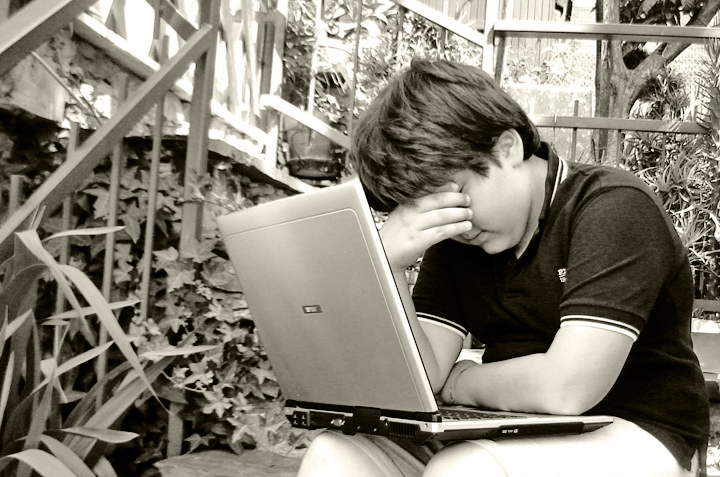 Facebook & Social Networking Influences on Children
Facebook & Social Networking Influences on ChildrenAs social media continues to grow in popularity, we are slowly starting to see more psycholgical research regarding the risks and benefits of social media / social networking use.
In a talk called “Poke Me: How Social Networks Can Both Help and Harm Our Kids,” Larry D. Rosen PhD, professor of psychology at California State University, Dominquez Hills, discussed the negative effects social media (e.g. Facebook) has had on children. Rosen conducted a study to determine how overuse of Facebook can lead to the development of psychological disorders in teens. The study was based on a sample size of 1,000 urban adolescents.
Negative points of note:
Note all research was negative. Below are some positive influences of social networking.
Positive points of note:
I am not sure whether these “positives” are much of a positive at all. It is good to learn “virtual empathy” but in the long run, time is better spend for a child or an adult to learn REAL LIFE empathy. The practice of interacting and socializing in real life context may cause some awkwardness and anxiety, but it is important for children and adults alike to practice so we can become fully functioning contributors to society, our friends, and our families. I do agree that social network does have incremental opportunities to interact and socialize with others, especially those who live far away, but the fear here is when people start to opt to send messages, emails, wall posts over phone calls and real life interactions where real life opportunities are lost.
Larry Rosen, offered some advice for parents by encouraging them to pay attention to the online trends and the latest technologies they are using but be aware that it will be difficult to monitor all of your child’s social networking activities.
“If you feel that you have to use some sort of computer program to surreptitiously monitor your child’s social networking, you are wasting your time. Your child will find a workaround in a matter of minutes,” he said. “You have to start talking about appropriate technology use early and often and build trust, so that when there is a problem, whether it is being bullied or seeing a disturbing image, your child will talk to you about it.”
Despite Rosen’s comments about monitoring your children, if you feel a desire to protect your child from harm, different Social Networking Monitoring tools are slowly coming to public. One such option is ZoneAlarm Social Guard. I have not used this product before, so please by all means, if you have any feedback please share in the comments below. Video introduction of ZoneAlarm Social Guard is below.
Click Here for More Info: ZoneAlarm Social Guard
[poll id=”24″]
Just a discussion starter. So share your your thoughts below…
What are your thoughts on the fact that three R Rated, raunchy comedies earned multiple nominations at the TEEN choice awards?
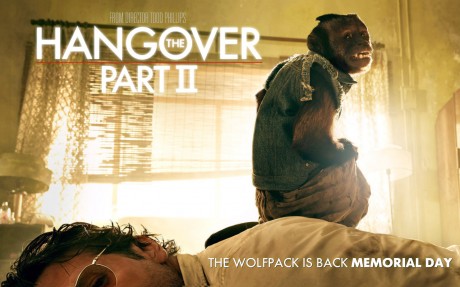
The three R rated movie in question are “The Hangover Part II”, “Bridesmaids” and “Bad Teacher”. The Hangover Part II earned a six nominations, while Bridesmaid and Bad teacher were nominated for best comedy. Remember this is the TEEN choice awards for 13-19 year-olds voting for what they consider the best movies, shows, and music of the year. Anyone under 17 must still be accompanied by an adult to watch these movies due to their content. The Hangover Part II and Bridesmaid have been one of the more popular movies of this summer. The Hangover centers around a Drunken Bachelor party romp where the characters can’t remember what happened.

“The Twilight Saga: Eclipse” led the pack with twelve nominations including best sci-fi fantasy film. TV Musical “Glee” follows with nine including top TV Comedy. The Twilight Saga swept the awards last season, but expects to face stiff competition from “Harry Potter and the Deathly Hallows: Part 1”, “X-Men: First Class”, “Pirates of the Caribbean: On Stranger Tides,” and “Super 8.”
So I pose the question again.
What are your thoughts on the fact that three R Rated, raunchy comedies earned multiple nominations at the TEEN choice awards?
I think, it’s a testament to how much our standards have fallen in terms of what is considered appropriate and not appropriate for our teen’s consumption, let alone public consumption as a whole (including adults!). I bet for most reader, this news doesn’t seem like big news at all. Is there anything that can be done or will our standards just fall lower and lower? Did you know the US Superior court overruled a law, saying it is ok for stores to sell Mature Rated video games to children? Also I remember just a mere 10 years ago, what passes as PG-13 today would cause a riot even though it was Rated R. It’s a slipper slope folks.

This just in. Shocking story! A study from Kidscape, a children’s charity, showed that young people feel more comfortable with themselves online than they are offline. 45% of 11-18 year olds said they were happier online.
” [it’s] easier to be who you want to be, because nobody knows you and if you don’t like the situation you can just exit and it is over. ”
Ok. So not really shocking.
Is any of this surprising to you?
• 60 percent of these kids admit to lying about their age
• 47 percent of these kids admit to behaving differently online than offline
• 40 percent of these kids admit to being dishonest about their personal relationships
• 10 percent of these kids admit to “[changing] aspects of their appearance and their personality for their online activity”
Is any of this surprising to you?
None of it really is, and many might say, hey that’s typical, that’s normal.
But hopefully we can all agree – this is sad.
Anyone else remember lying online or perhaps have a good story about it?
 “Skins” the Hottest New TV Show
“Skins” the Hottest New TV Show“It is one thing to be documenting reality, it is an entirely different matter when you are manufacturing a representation of the youth lifestyle…”
A new MTV show “skins” started in January 17 with 3.3 million viewers, 2.7 million of them within 12-34 age range, making it the largest show launch in MTV History. Show creator Bryan Eisley called it “a very simple and in fact rather old-fashioned television series about the lives and loves of teenagers, how they get through high school, how they deal with their friends, and also how they circumnavigate some of the complications of sex, relationships, educations, parents, drugs and alcohol.”
Sounds like a good TV show that helps us see the true lives of teenagers right?
The Parent Television Council calls it “the most dangerous program that has ever been foisted on your children.”
Let’s be clear, MTV has no qualms promoting this show to a young audience, yet the show is rated TV-MA. It even uses actual teenage actors rather than adults depicting teens. One actor is as young as fifteen. The show has been accused of child pornography due to the nudity shown with underaged actors. It’s been called the most racy show ever. But even more telling is how the advertising world had responded.
Advertiser after advertiser, sponsor after sponsor has pulled out of these series due to it’s controversial content. Subway, General Motors, L’Oreal, Wirgley, Taco Bell, Dominos, Foot Lockers & Schick. Good riddance. Perhaps much of the decision was more of a brand play than anything as stated…
“There are few advertisers that are willing to put their neck on the line for any show… there is no lack of youth to reach in the marketplace. Why court backlash when you can find this audience somewhere else?” (Advertising Insider)
Though to their credit, many of these companies protested the underage sex and heavy drinking.
“It was never our intent to endorse content that could offend our consumers,” Wrigley said in a statement. “Any ads that previously aired during the show were part of a broader advertising plan with the network [MTV].”
I just wish they would of just said “It was never our intent to endorse content that is WRONG”. Rather than what offends consumers. The decision should be made regardless not because of self-preservation.
However, when the advertisers pull their sponsorship, that means the money is not there which hopefully would deter networks from heading into this direction. So though the motive might not be correct, none the less we should be thankful the advertisers have pulled out their sponsorships.
This isn’t the only show focused on youth “life” and youth transgressions. In fact to no one’s surprise, Hollywood is obsessed with sexualizing teen girls, according to a study released by the Parents Television Council.
The study, which looked at the top 25 shows on broadcast television among viewers age 12-17, found that underage female characters have a higher percentage of sexual scenes compared to adult characters. It also found that only 5% of underage female characters showed any dislike about a sexual situation.
From “16 and Pregnant” and “Teen Mom”, MTV has really capitalized on the interest of those in this age range. MTV and other networks often try to sell these shows as trying to depict “real life” and scaring teens from doing bad things.
Bryan Eisley says “It is just that these are characterized from the point of view of the many young people who write the show and has a very straightforward approach to their experiences; it tries to tell the truth,” he continued.
It’s the argument that, hey if it is real life, we should be able to show it.
But is it really necessary to show scenes that can be just implied? And why so graphically?
Also shows like “Skins” seem to fail in both depicting reality as it is and preventing teens bad habits.
A Virginia Tech senior writes in an article in Collegiate Times “What I find most irksome about [Skins] is simply how far removed from reality the premise and the character depictions truly are… to suggest that those experiences comprise the majority of high school students’ lives is not just irresponsible: It isn’t true.”
Another insider writes “It is one thing to be documenting reality, it is an entirely different matter when you are manufacturing a representation of the youth lifestyle,” an insider says. “Drug use or sexual activity as ‘news’ is very different than those same subjects as ‘entertainment.'”
In other words, the show is made for drama and made for TV. However the effect it could have is to plant ideas of what is the norm for teenagers and even adults.
If we watch enough of a certain lifestyle lived out as if it is normal, we start to assume those lifestyles as the norm of society.
Even MTV themselves have said “Young adults 15-17 are excited consumers and extremely impressionable,” MTV tells advertisers. “Now is the time to influence their choices.” Yet do they not realize, that they are influencing their choices, just in the worst way possible by altering their norms and desensitizing them to this kind of lifestyle?
Again Bryan Eisley argues that “We proceed not from the idea that teenagers are inherently likely to misbehave, but rather that they are intensely moral and disposed to make judgments on their own and others’ behavior,” he wrote in his Huffington Post blog entry.
Really? Do you interact with teenagers at all? Have you been a teenager? When I was a teenager I was always struggling with temptations, heck I still do now (with thankfully more restraint than before). I would argue that we as human beings are actually not moral at all if left to our own devices. Remove all sense of law and punishment and it would be utter chaos. That is a worldview not true to reality folks.

Congressman Joe Baca (D-Rialto, CA.) introduced a bill that calls for “all video games with an Electronics Software Ratings Board rating of Teen or higher” must include a health warning label stating:
“WARNING: Excessive exposure to violent video games and other violent media has been linked to aggressive behavior.”
This new bill co-signed by Rep. Frank Wolf (R-VA) called “The Video Game Health Labeling Act of 2011” and would create a new rule within the Consumer Product Safety Commission (CPSC).
“The video game industry has a responsibility to parents, families, and to consumers – to inform them of the potentially damaging content that is often found in their products… They have repeatedly failed to live up to this responsibility. Meanwhile research continues to show a proven link between playing violent games and increased aggression in young people. American families deserve to know the truth about these potentially dangerous products.”
Parents Must be Warned of Potential Harm!
“We must hold the video game industry accountable and do everything in our power to ensure parents are aware of the detrimental effects that violent games can have before making decisions on which games are appropriate for their children to play… I am proud to introduce the Video Game Health Labeling Act, and am hopeful this legislation can work to stop the growing influence of violent media on America’s children and youth.”
– Congressman Joe Baca
Representative Baca cites several scientific studies from the Pediatrics Journal, University of Indiana, University of Missouri, and Michigan State University that showed a “neurological link between playing violent video games and aggressive behavior in children and teenagers.”
“Just as we warn smokers of the health consequences of tobacco, we should warn parents – and children — about the growing scientific evidence demonstrating a relationship between violent video games and violent behavior,” co-signer Rep Wolf said. “As a parent and grandparent, I think it is important people know everything they can about the extremely violent nature of some of these games.”
My take? It may pass, it may not, but it won’t do much in terms of raising awareness among the masses. People in the blogosphere, especially gamers will make rant at it, but ultimately it won’t get much attention or affect sales.
In terms of violent games affect on people: my opinion is YES it does have an effect. I am not saying playing violent games will lead people to commit massive murder or kill their parents (though that does happen…), but it does affect our sensitivity towards violence, changing our standards in terms of how we view different levels of violence. Don’t tell me a child who grows up never watching violent movies, playing games that has to do with shooting people, or games that glorify stealing cars and robbing people will have the same perception of violence as someone who grows up not viewing such things. Perhaps they may not be inclined to do those things, but when such pressures or occasions come, perhaps out of their control, how we grew up and what we are exposed to definitely has an impact in the worldview we have towards such things.
Feel free to agree or disagree, but that is my first take.
 92% of US Toddlers have Online Presence!
92% of US Toddlers have Online Presence!The Internet security firm AVG, recently released a study of 2,200 mothers across the revealed that 81% of children 2 years or younger have some form of online presence! How much has the internet grown that 4 out of 5 kids are online so early on in their life. Online presence could mean anything from an uploaded video of their child, some photos up on the web, or in some cases a full profile on a social networking site.
Some Quick Statistics:
Wait What? That is right. 23% of parents share images from their prenatal sonograms on the web. In the US, this jumps to 33% of parents. This means the children are on the web before they are born!
% of Children with Sonograms Online
I find it surprising Japan isn’t hire on this list considering how modern and progressive the country tends to me with technology.
How about these statistics?
How spooky would it be when you try to open a facebook account only to discover you are already on the web. And your parents have been posting cute, embarrassing pictures of you since.. you were born?
Only 3.5% expressed concern about the amount of information that would be available about their children in future years…
Well consider this- most 30 year olds have an online footprint stretching back 10 to 15 years. That is amazing in itself, but these children will have an online footprint – for a longer time then they have lived!
Will all the information that are posted be available in the future years as the few 3.5% parents were concerned about? I’ll solve the mystery right now. YES. Once content goes on the web, it’s pretty much there forever, no matter what you try to take it away. It is very important for parents to think carefully about what kind of information they will be sharing about their children online. It will follow them for the rest of their life. Anyone can see it. Friends? Job Hiring Managers? If they ever become politicians or someone high profile – all of it will be publicly available.
Take the poll below, and give us your thoughts in the comments!
[poll id=”22″]

EA’s Medal of Honor is one of the most successful and well known first-person shooters available. In October 12, the latest rendition is due to be released but with a twist – it takes place in Afghanistan and in multiplayer mode, you are allowed to play as the Taliban.

Playing as the enemy is nothing new in video games. Playing as part of the mob, or in games like grand theft auto – playing as criminals killing cops and innocent civilians. Playing as the enemy in war games is also nothing new.
The point of contention with this game is that it is being released while US Soldiers are still in Afghanistan. It is an on-going conflict with many families who have loved ones still still serving overseas. No one argues against games placed in WWII or other long passed wars, but the fact that this game takes place in a current war, has stirred quite a bit of controversy.
A Gold Star Mother Meredith came on Fox & Friends to express how she and many other people have with this title. She
how it is disrespectful especially to families who are losing their children in the war. Meredith herself lost her son in Afghanistan.
“We’ve just come off of the worst month of causalties in the whole war… and this game is going to be released in October. So families who are going to be burying their children are going to be seeing this… I just don’t see that a video game based on a current war makes any sense at all. It’s disrespectful.”
Even the British Defense Secretary Liam Fox had a lot to add to this controversy.
“[It is] shocking that someone would think it acceptable to recreate the acts of the Taliban against British soldiers.”
“At the hands of the Taliban, children have lost fathers and wives have lost husbands.”
“It’s hard to believe any citizen of our country would wish to buy such a thoroughly un-British game. I would urge retailers to show their support for our armed forces and ban this tasteless product.”
[Note that no British Soldiers are actually explicitly in the game. Dr Fox is alluding to attacking ISAF troops in the area of central Helmand where British troops are operating”]
I still remember vividly the tragedy of 9/11. I still remember how horrible and painful it felt to witness such an horrific event. I also remember in a moment of random thought how long it would be before people started to pump out movies on this matter. Movies on WWII are abundant but they all came out years after the wars have long passed. The images from “Saving Private Ryan” or even movies like “Pearl Harbor” would have been excruciating for anyone remotely connected to the war or those who were in it. No one would dare make a movie on 9/11 right away, but how can you know when it is ok? Several movies came out later depicting the conflict but since some time of healing had passed no one flinched.
So the question again is..
What are your thoughts on this matter?
Please do not just say “it’s just a game” or “so and so is a retard” or “if you don’t like it don’t play it”. These are not arguments, it’s a bit of a cop-out and often demeaning.
The question is whether the timing of this game (clearly for the sake of profit) is in bad form or if it’s legit.
An even deeper question if you dare:
I think the answer to these questions are more disturbing than any of the debate over this game.
[poll id=”20″]

Here at Clean Cut Media, instead of just bemoaning and deriding degrading media, we also like to promote and share a good CLEAN ad, commercial, movie or video when we see one. Bad media is often just driven by the fact that things like violence and sex simply sells, so it’s important we support what is good and clean. Other times, we just share because we like it! These Improv Everywhere videos? It’s clean and we just like it!
Improve Everywhere is a group that organize giant scene stealing events in public areas. Their “missions” are hilariously fun. They unfortunately aren’t always squeaky clean, but the ones they are best known for all are really fun to watch.
Below is their most recent mission “Princess Leia & Darth Vadar Star Wars Subway Scene” as well as 4 other great mission worth watching. Don’t miss out on “Frozen Grand Central” and “Food Court Musical” both are classics.

Princess Leia, Storm Troopers and Darth Vader invades the New York City subway car reenacting a scene from Star Wars. Since the white sliding doors were very similar to the doors from the rebel ship, they utilized multiple stations to have different characters enter into the scene. Very well done.
The buildup was great. By the time Darth Vader enters in the third station, every erupted in laughter. Especially as Darth Vader first time hit his head on the roof due to the height of his helmet.
Enjoy the video below:
 I can forsee many more episodes being a huge hit. See the video right below these pictures.
I can forsee many more episodes being a huge hit. See the video right below these pictures.
Shot by: Matt Adams, Jason Eppink, Erik Martin
Cast: Princess Leia (Cody Lindquist), Stromtroopers (Patrick Cassels, Brian Murphy, Josh Ruben). Darth Vader (Alex Scordelis)

Imagine walking through one of the busiest train stations in New York then suddenly you realize everyone around you is frozen still! Sounds eerie? This is exactly what happened in Grand Central New York when 207 “agents” or participants all froze at exactly 2:30PM in all sorts of different poses and scenes.
Strangers started to talk to each other trying to figure out what is going on. Others took pictures with the frozen agents.
16 Agents create a spontaneous musical in a food court in a Los Angeles mall. The cameras were hidden throughout the scene and their voices were amplified throughout the food court via wireless microphones and the mall’s announcement system.
This mission was spawned by requests from fans that thought it was so random that people just break out in song in musicals. So Improve Everywhere finally took up the call.
The best is the slow buildup where different people from the audience would join in the musical and break into song. Audience reaction was priceless especially during a couple “twists”…
The song was an original written by Scott Brown and Anthony King. Very well done. The choreography was done by Agent Tallaksen.
Song by Scott Brown and Anthony King
Arranged by Jamie Laboz
Numerous Agents come to a random little league game and make it into a full major league baseball experience. The teams, coaches and parents have no idea what is going on. A huge crowd shows up, they setup a jumbotron, NBC Sports comes to announce the game over the PA system, and a blimp flies overhead capping this incredible experience for the children. The announcers knew the kid’s names, nicknames and the crowd was fired up throughout. Pretty sweet experience for the kids.
Apologies for the thumbnails of the crazy fans. Why they chose that thumbnail I don’t know, but the video itself is very clean. It was a fun experience for the kids involved.
6 undercover agents start a “spontaneous” musical in a grocery store in Queens. The musical was shot with hidden cameras and amplified through the store’s PA system.
Song by Scott Brown & Anthony King
[poll id=”18″]
 Top 10 General Security Tips for Facebook
Top 10 General Security Tips for FacebookFacebook is growing at a rapid rate, and now with Facebook open graph, they are looking to “socialize” all the world’s large webpages to be custom to your profile and social network.
So how do we protect our privacy?
If you don’t know how just visit this step by step Facebook privacy settings post.
Once you have your privacy settings set – consider the following tips:
Once you have accepted someone as your friend they will be able to access any information about you (including photographs) that you have marked as viewable by your friends. You can remove friends at any time should you change your mind about someone. Remember by making someone your friend, you are now giving them full access to majority of the information you post on Facebook.
You can organize your friends into different lists (church, co-workers, friends, family, monsters etc). Then you can create different accessibility and privacy options for each one meaning specify what they can and cannot see.
Avoid putting in any info you don’t need to share! No Address, no Phone Number, no Email. If you choose to do so make sure in your privacy settings ONLY friends can see it. (then be selective about who you friend).
Careful what photos or videos you post. Once it’s on the web, it’s on the web. Also be sensitive to the pictures and videos you share of your friends. It is embarrassing? Incriminating? Immature? Or just a really bad picture of them? Save your friend the drama and don’t post it. Imagine if someone posted such a picture and tagged you for all the world to see.. (or just friends if you diligently went through the privacy settings!).

Depending on your privacy settings, lot of people may have access to your wall, so becareful what you post. Examples:
Facebook application sometimes requests information, others automatically posts things to your wall. You may get invitations to try out apps from others – but unless you know what it is just avoid it altogether. By nature, Facebook apps are made to utilize your profile information and social connections.
Do not leave your full birthdate (your birthdate is valuable information) leave out the year.
If your children use it, you need to monitor what they say. They are not educated in what kind of info is bad to share. (ex. “i am home alone”, “we are leaving tonight to go for a 2 weeks vacations”). You should also be weary about who is talking to them and vice versa. You should setup their privacy settings and then “friend” your children. Even better – just make it a rule you have their password so they can login whenever they want.
Do you like this article? Please “Like” our Facebook Page!
It’s simple. Don’t say, write, post up anything that is even slightly embarrassing. When you put info up on the web, there is always the possibility someone will find it. Your friends, your co-workers, your boss, future recruiters, your mom, your arch enemy, your political opponent, the guy 10 years from now try to sue you, some stalker, some guy planning to rob your home, guy looking for more identification for identify theft and so on. Yes some of these are ridiculous – but again, better safe than sorry. Save yourself potential future headache by playing it safe and thinking carefully about what you post.
Hope this was helpful.
Facebook is looking to simplify their Privacy Settings again so we’ll see what happens next.
 There has been a lot of news about Facebook Privacy concerns in news lately. However in my opinion, it’s being overblown by the media because it is a juicy subject to talk and write about. It capitalizes on the new big fear of privacy in the rapidly growing online world. But recent history shows that privacy concerns are short lived. Privacy issues always come up whenever large companies like Google or Facebook launches something new and different (i.e. Google Buzz, Facebook News Feeds etc). Usually the companies respond with a new set of privacy features and within weeks all the clamoring dies down as people accept it as the norm.
There has been a lot of news about Facebook Privacy concerns in news lately. However in my opinion, it’s being overblown by the media because it is a juicy subject to talk and write about. It capitalizes on the new big fear of privacy in the rapidly growing online world. But recent history shows that privacy concerns are short lived. Privacy issues always come up whenever large companies like Google or Facebook launches something new and different (i.e. Google Buzz, Facebook News Feeds etc). Usually the companies respond with a new set of privacy features and within weeks all the clamoring dies down as people accept it as the norm.
The last Facebook uproar was more legitimate as it was a demand from the public that Facebook provide privacy options so the user can better control what gets shared. Facebook responded by providing more privacy settings. Facebook doesn’t have it right just yet and needs to provide more functionality, but all the concerns about sharing information shouldn’t be blamed on Facebook because we have the settings control to limit what get’s shared. By nature Facebook is a social site – meaning it is meant to be able to share information so it shouldn’t be alarming that Facebook makes it easy as possible for information to be shared.
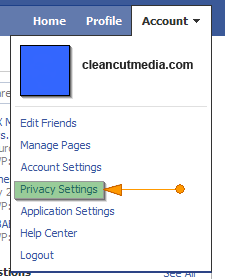 It boils down to two things:
It boils down to two things:
1) Use privacy settings to be safe and limit who has access to what on your profile.
2) Be very careful about what you share. Once it is out on the net it is OUT.
Ok that makes sense. But let’s break it down below step by step as well as some of my personal recommendation to help you get started in protecting your Facebook account. By all means you should tailor the accessibility to your info to what you are comfortable with. I only share my own “minimum recommendation” as a starting point since it may be helpful for some.
Minimum Recommended Settings in [Brackets]
[Located on the top right nav bar under “account”. Select Privacy Settings]
Adjusting your Facebook privacy settings is a must to help protect your identity and to prevent mass sharing of personal information. GO THROUGH EACH LINE ITEM. I’ve listed all the settings but only highlighted the more important or confusing ones below. Where relevant I’ve also added my personal recommended “minimum” setting in brackets. Hope this helps.
The Privacy Settings page is organized into the following sections:
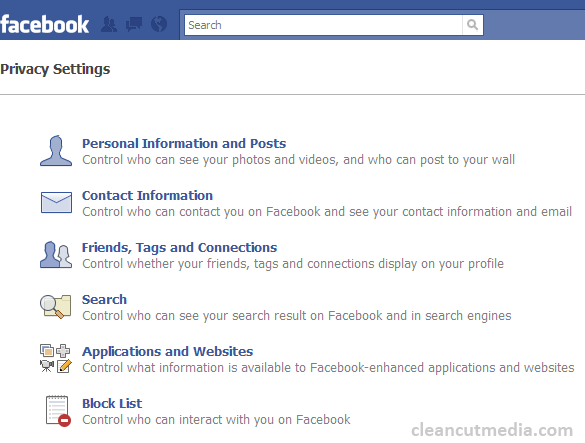 Personal Information and Posts:
Personal Information and Posts:Covers personal details like your birthday, email address and political views. It also covers your content and content others have posted to your Wall. You control who is able to see each type of information.
Covers contact details like your mailing address and phone number. We recommend you make this visible to friends only.
Covers information and content that’s shared between you and others on Facebook. This includes relationships, interests, and photos you’re tagged in. These settings let you control who sees this information on your actual profile.
Be very careful about what you post and keep in mind who can access it. If you have odd activities or interest that you don’t want your co-workers, your mom, or your children to know… then… actually you probably shouldn’t be doing those things!.. But you get the idea.
Facebook Search Results: [Everyone] – If you don’t want your friends and old contacts to find you, you can limit it right here. If you put “Friends” no one will be able to find you, until you invite them to be your friend. Why would I not want my friends to find me? If your friends can find you, so can that old stalker boyfriend, the ex-wife, bad influences from the past, old acquaintance you want to avoid and so on.
Public Search Results: [Disallow] – Just opt-out. Why make it so easy for random strangers, recruiters, stalkers to find you via Google? Unless your goal is to have the biggest friend list in all of facebook, just turn it off.
Covers what information is available to the applications you and your friends use.
Allows you to identify specific people who you want to prevent from interacting with you on Facebook.
Do you like this article? Please “Like” our Facebook Page!
Hope this was helpful.
Facebook is looking to simplify their Privacy Settings again so we’ll see what happens next.
Please come back for our follow-up post “Top 10 General Security Tips for Facebook”.
 Prepare for an overload of Teenager Texting Statistics:
Prepare for an overload of Teenager Texting Statistics:
Just the Girls
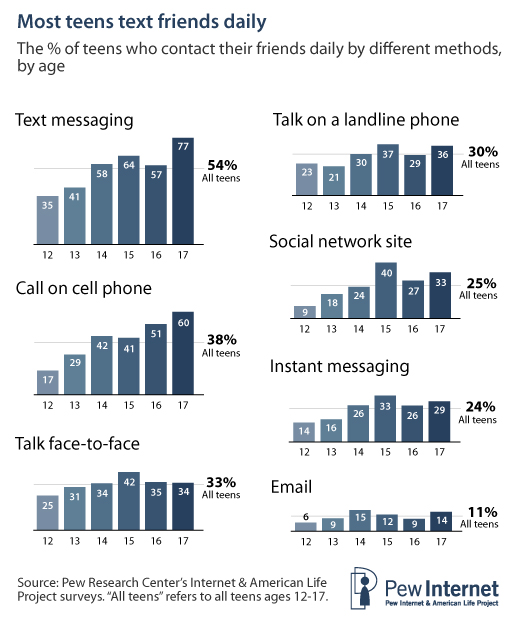
“If a girl puts a period at the end of a text message (to another girl) then it comes across as she’s mad,” Campbell said, which explains the prevalence of smiley emoticons.
“They have these practices because they’ve learned that texts can lead to misunderstandings,” Lenhart said. “It’s a deliberate thing and it’s also part of a culture that’s interested in differentiating itself from adult culture.”
For parents, teens’ attachment to their phones is an area of conflict and regulation.
Parents exert some measure of control over their child’s mobile phone — limiting its uses, checking its contents and using it to monitor the whereabouts of their offspring. In fact, the latter is one of the primary reasons many parents acquire a cell phone for their child. However, with a few notable exceptions, these activities by parents do not seem to impact patterns of cell phone use by teens.
Cell Phone Uses Functionality
Texting & Driving
That my friends, is a ton of statistical information. What is clear is that texting has become the favored form of communication for teenagers. 100-200 texts a day? Many will grow to have finger arthritis at that rate. But seriously, what are your thoughts in all this?
Though I see it can be beneficial in being able to stay constantly connected to friends, what I fear the most is that when teenagers grow up relying on less personal mediums that do not requires face-to-face interaction – it could have some negative effects in the way a teenager is able to relate to people in real life situations. It is so easy to text something, especially something seemingly uncomfortable, then to pick up a phone and call or *gasp*.. meeting up with someone. It creates a easy way to not experience the real work of building personal relationship. Just a thought. What do you think?
Take the Poll: Come Back to See Results:
[poll id=”15″]
South Korea is easily the video game capital of the world. With the fastest connections and a huge base of gamers young and old, it is no surprises that the idea of playing games is so integrated into their psyche.
Unfortunately, this also means there are more cases of video games resulting in harmful consequences. Recently a Korean couple, Kim Yoo-chul and Choi Mi-sun, was arrested for the neglect of their 3 month old child as they devoted themselves to hours of playing a computer game which involved of all things, raising a virtual child.

The 41-year-old man and 25-year-old woman, who they themselves originally met through a chat site, had left their infant unattended for long periods of time as they went to internet cafes to raise their virtual child. They only stopped by to feed their child powdered milk. They arrived home after playing for 12 hours at the local internet cafe to find their infant daughter dead. The police suspected neglect due to the baby’s malnourished body which was later confirmed by an autopsy.
Up until two weeks before the death on Sept 24, 2009, the baby had been taken care of by Kim’s parents as the couple was finding it difficult to take care of their premature baby. As Kim’s mother was ill, the baby was given to the couple for care. After the funeral the couple disappeared for months until they were found on March 2, 2010 at the wife’s parents home in Yangju, Gyeonggi province.
The game is called “Prius Online”. It is a very popular role playing game where you can create a virtual life in a virtual world. You create your character and traverse through life as you interact with other users, find jobs, build a family and so on.
Chung Jin-Won, a police offer said “The couple seemed to have lost their will to live a normal life because they didn’t have jobs and gave birth to a premature baby… they indulged themselves in the online game of raising a virtual character so as to escape from reality, which led to the death of their real baby.”
The case has shocked South Korea once again highlighting obsessive behavior related to the internet.
This is not the first of such incidents involving the obsession over video games.
In 2005, a man died in a internet cafe in Taegu after playing Starcraft for nearly 50 hours straight. He suffered cardiac arrest after not eating or drinking during that time.
In September of 2009, a young man murdered his mother for nagging him about playing too much video games. He then went to a local internet cafe and just continued to play games as if nothing had happened.
Of course these incidents are unique just to Korea as the child that killed his mother over the game of halo was well publicized here in the United States.
As these incidents continue to arise, there has been some movement to battle these dangerous and upsetting trends. Lee Joung-sun, an MP from the ruling Grand National party of South Korea has submitted a bill restricting the hours of online gamers. There are several such bills pending in the national assembly with varied proposals of how to limit teenagers’ time at internet cafes and limits to online game.
These kind of incidences highlight the uneasy notion how these addictive games, as well as the general increase in internet use, has had a direct impact on the way we live our lives and relate to others. It is easy to point at these perpetrators in shock and blame them for being “neglectful” or “dumb” or even “crazy” while brushing off how the internet as a whole has had some negative impact in society as a whole.
Children from an early age sit in their rooms playing games hours into the night rather than developing their social skills by playing outside with their friends. The negative effects of media usage on children are well documented. As they children consume 7.5 hours of media a day, their worldview in terms of how to understand themselves, understand others, and understand the world are defined by what they see on the screen. Even adults spend hours and hours watching online videos or playing online games as soon as they come home from work. An average American watches 153 hours of TV a month while going online 68 hours a month!
Yes, the perpetrators are at fault and are completely responsible for what they did. However, it really say something about the our ever-pervasive dependence on media as well the status of our culture that these kind of horrible incidences can even occur.
Follow Clean Cut Media @CleanCutMedia Twitter!